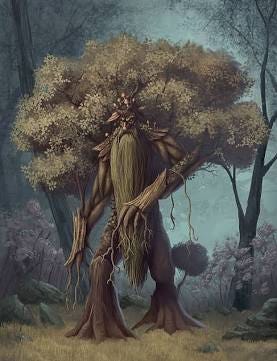“One felt as if there was an enormous well behind them, filled up with ages of memory and long, slow, steady thinking; but their surface was sparkling with the present; like sun shimmering on the outer leaves of a vast tree, or on the ripples of a very deep lake. I don’t know, but it felt as if something that grew in the ground – asleep, you might say, or just feeling itself as something between root-tip and leaf-tip, between deep earth and sky had suddenly waked up, and was considering you with the same slow care that it had given to its own inside affairs for endless years.’” (The Two Towers, 53)
In chapter 4 of Tolkien’s The Two Towers, Pippin’s awestruck account of Treebeard’s eyes is, to me, among one of the most evocative passages in all the Legendarium. He describes them as a well “filled up with ages of memory and long, slow, steady thinking,” yet sparkling with the light of the present, like the shimmer on the outer leaves of a great tree or ripples of a deep lake. Beneath that present sparkle lies a depth that has pondered the mystery of its own existence for uncountable years, from “root-tip to leaf-tip,” from “deep earth to sky.” These are, quite simply, the eyes of wisdom.
Wisdom’s eyes, as Tolkien shows, are more than the eyes of intelligence, more than the eyes of knowledge or skill. They are patient eyes, slow to rush, and yet full of life. Wisdom does not burn with a feverish light like the eyes of Saruman, ever seeking to manipulate, to bend, to dominate. Rather, wisdom’s gaze is settled, stable, and rooted, reflecting a mind that has first interrogated its own soul before attempting to interpret the world.
Treebeard’s eyes serve to show us that true wisdom is a harmony between depth and presence. It is not imprisoned in the past, nor distracted by the immediate, but holds both in steady tension.
Pippin’s image of “something that grew in the ground” suddenly waking up is a perfect metaphor for how wisdom emerges. Like a seed buried deep, it germinates unseen, drawing on hidden resources of history, experience, and memory. When it finally emerges into consciousness, it brings with it a knowledge as ancient as the earth itself, yet perfectly adapted to the present. Such wisdom cannot be manufactured or forced; it must be cultivated slowly, over years of careful attention to reality, both outward and inward.
And what does wisdom’s gaze do? It considers. “Considering” is a lost art in our age of rapid reaction and instantaneous opinion. Treebeard’s eyes, Pippin says, regarded him with the same slow care that Treebeard had given to his own affairs for endless years.
That is the gift of the wise: they do not look at us with a glance designed to measure, to categorize, to label. They consider us with deep respect, willing to weigh and wait. There is an attentiveness in such eyes, a hospitality of the mind, which is rarer than gold in our impatient world.
Moreover, Tolkien’s metaphor of the eyes as a deep well is worth meditating on. A well is something drawn from, usually it is a source of refreshment. Wisdom, too, refreshes those who draw near. In the presence of true wisdom, the restless soul is stilled, for it senses a depth vast enough to contain its fears and hopes alike. In a culture saturated with shallow commentary and frantic news cycles, we ache for such wells, eyes that carry a history and a rootedness we ourselves have lost.
At the same time, these wise eyes are not dull or inert. Their surface sparkles with the present, says Pippin. Wisdom is no museum relic; it is living, dynamic, and fully awake. It is precisely the one who has learned to think slowly and carefully who is most awake to the present moment, able to see its significance without being swept away by its urgency. Wisdom’s eyes do not merely look through us, but at us, here and now, with attention undistracted by ego or panic.
In Christian tradition, wisdom unsurprisingly is often personified as a tree , a rooted source of healing whose leaves are for the healing of the nations. Tolkien’s Ents, and Treebeard especially, draw richly on that biblical vision of wise, rooted life. In a world gone mad with speed, violence, and pride, wisdom’s eyes stand firm and ancient, yet kind. They measure slowly, they ponder gently, and they bless abundantly.
Pippin felt, before those ancient eyes, the gaze of something that had waited a long time to speak, that had listened to the voice of earth itself, and only then had decided to wake up and look upon him. That is the voice of wisdom emerging from quietness, from humility, from a listening heart. That is why Treebeard, though fierce in war when finally roused, is first and last a shepherd and a steward, not a conqueror.
In the end, to cultivate “wisdom’s eyes” is to become like Treebeard: to be rooted in memory, to be alive in the present, to listen before speaking, to consider before judging, to wonder before dismissing. It is to carry, in one’s gaze, an invitation for others to pause, to rest, to remember. That is the gaze our world desperately needs. Not a cold, appraising eye of cynicism, but a living well of memory and hope, shimmering like sunlight on deep waters.
May we, like Treebeard, awaken from our own root-tip to leaf-tip, and learn to truly see with wisdom’s eyes.




